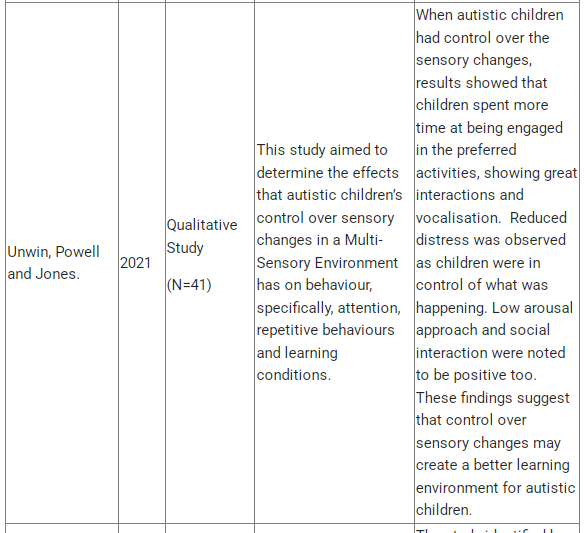| Category | Assignment | Subject | Education |
|---|---|---|---|
| University | --- | Module Title | EE600P Research Methods for Evidence-Based Practice and Dissertation |
Educators’ Views on Sensory Environments and Their Role in Supporting Neurodivergent Children in Early Years Settings
As early years educators are so important in shaping inclusive learning environments, which are essential for all type of learners, including neurodivergent learners, we want to hear from you. Visual, auditory, tactile and proprioceptive components (sensory environments) often play a huge role in helping children become more or less engaged, being regulated, or coping with the situation, which has been explained in early childhood education settings.
According to current literature, such as Tamblyn et al. (2023) and Friedman et al. (2024), sensory-sensitive classroom modifications enhance neurodivergent children’s achievement and decrease distress. Even though the early years educators begin to be aware of sensory needs, there is still a lack of qualitative research in the field of sensory responsive practices that looks at the early years’ educators’ own experiences, understanding and how to apply strategies to provide sensory responsive practices.
The present research aims to fill in this gap by exploring the views of educators who directly interact with young neurodivergent people in early years settings. In line with priorities in the field of neurodiversity, as well as those about inclusive education in the early childhood classroom.
The study will be conducted in Early Years settings, such as a preschool, within the same local education authority. Mainstream and inclusive settings catering for children aged around 3–6 years constitute the major group of these. Early years practitioners involved with working with neurodivergent children (AIM workers) will be recruited after ensuring they qualify early.
Aim:
To understand early years educators’ opinions about how the physical environment of sensory environments affects the learning, well-being, and participation of neurodivergent children.
Objectives:
Do You Need Assignment of EE600P Assignment
Order Non Plagiarized AssignmentA semi-structured in-depth interview will be used to collect in-depth data for this qualitative study. It will allow the participants to share lived experiences and personal insight within a phenomenological approach.
Data Source: Thirty to forty-five minutes of interviews based on participants’ choice of being interviewed face to face or through video call.
Research tool: An open-ended question method will be used in a semi-structured interview guide, which relates to sensory environments, practical examples of classroom adaptations and participants’ views of working with neurodivergent children.
Data analysis: The interview data will be transcribed and subjected to thematic analysis in line with Braun and Clarke’s (2006) six-step method.
The target population is early years educators who have previously worked with children who identify as neurodivergent. We will use a purposive sampling strategy, which ensures that the group and insights selected are appropriate.
Sample size: 4–6 participants
Early years educators (at least 1 year of experience) currently employed in settings with neurodivergent children.
Participants: The recruitment will take place through email invitations sent to individuals through their professional networks, as well as through some early years settings.
Identify any potential risk/Demonstrate ethical awareness.
Since the data collection method (such as focus groups and classroom observations) is intensive, the study may be limited by a small sample size. Although the findings may be of generalisability for similar early years contexts, the methodology will depend on being able to recreate similar environments or situations. Changes in the environment may have long-term impacts, but time constraints may limit the ability to observe such changes. In addition, social desirability bias may lead educators’ responses to be influenced by which topic is under discussion (inclusive practices). Logistical issues arising from access to some early years’ settings and the willingness of some staff to take part in the study may also limit this study.




Buy Answer of EE600P Assignment & Raise Your Grades
Order Non Plagiarized AssignmentFacing challenges with your EE600P Research Methods for Evidence-Based Practice and Dissertation? Well! Stop worrying now. You are at the right place. Our platform provides assignment help. We have experienced writers who provide high-quality, no-plagiarism assignments with 100% original content, and we are assured that our Ireland Assignment Help will make you productive and help you achieve high grades in your academic year. And we also provide free assignment samples that content have written by the phd expert writers Contact us now!
Hire Assignment Helper Today!
Let's Book Your Work with Our Expert and Get High-Quality Content
